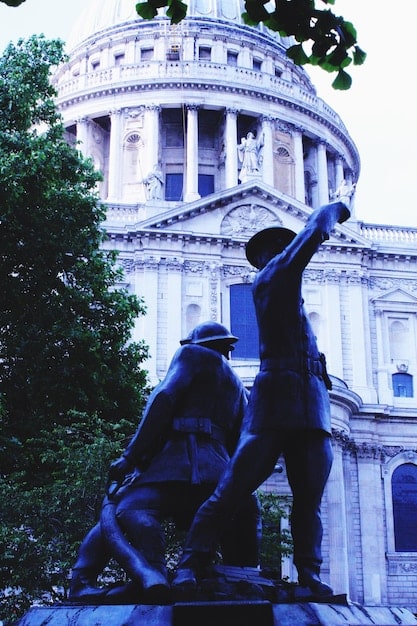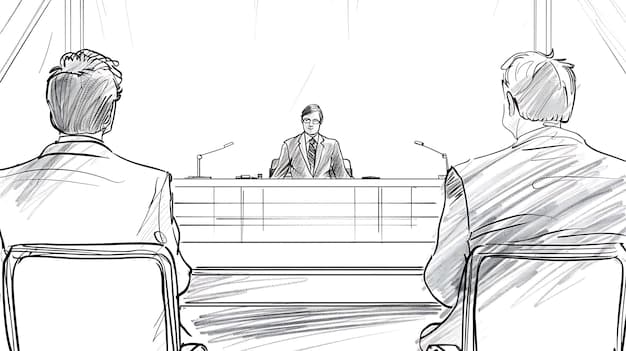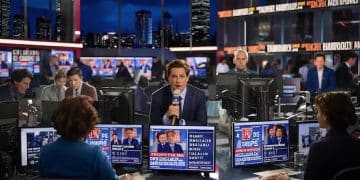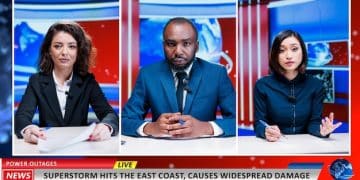Congressional Hearing to Investigate Bias in TV News Coverage

A Congressional hearing is scheduled next month to investigate allegations of bias in TV news coverage, addressing concerns about fair and impartial reporting.
The upcoming Congressional hearing is set to delve into the pressing issue of bias in TV news coverage. This investigation aims to address growing public concerns over fair and impartial reporting across various news networks.
Why is Congress Investigating TV News Bias?
The decision to hold a Congressional hearing on TV news bias stems from several factors. Public trust in media institutions has been declining, with many viewers expressing concerns about the objectivity of news reporting. Claims of partisan bias and the spread of misinformation have fueled demands for greater accountability in the media landscape.
Furthermore, the proliferation of media outlets and the rise of social media have created an environment where biased or misleading information can spread rapidly, influencing public opinion and potentially undermining democratic processes. The hearing aims to explore these issues and determine whether regulatory or legislative action is necessary to ensure fair and accurate news coverage.
Growing Concerns Over Partisan Divide
One of the primary drivers behind the investigation is the increasing partisan divide in the United States. Many believe that TV news outlets contribute to this division by presenting information in ways that cater to specific political ideologies, reinforcing existing biases and alienating viewers with differing perspectives.
Impact on Public Trust
The erosion of public trust in media institutions is a significant concern. When viewers perceive news outlets as biased or untruthful, they may become less likely to trust information from any source, making it harder to address critical issues such as public health, climate change, and economic policy.

The Congressional hearing seeks to understand the extent to which TV news bias contributes to this erosion of trust and to identify potential remedies for restoring faith in journalistic integrity.
- Assess the prevalence of bias in TV news reporting.
- Examine the impact of bias on public opinion and democratic processes.
- Consider potential regulatory or legislative actions to ensure fair and accurate news coverage.
- Evaluate the role of media ownership and corporate influence.
In conclusion, the Congressional hearing on TV news bias is a response to growing public concerns about the objectivity and fairness of news reporting. It aims to explore the factors contributing to perceived bias, assess its impact on public trust and democratic processes, and consider potential actions to ensure that TV news outlets provide accurate and impartial information to the public.
Who Will Be Called to Testify?
The Congressional hearing is expected to involve testimony from a diverse range of individuals and organizations. These may include representatives from major TV news networks, media experts, journalism ethics advocates, and members of the public who have been affected by biased news coverage.
The selection of witnesses will likely be influenced by the scope of the investigation and the specific issues that the committee intends to address. By hearing from a variety of perspectives, the committee aims to gain a comprehensive understanding of the challenges and complexities associated with TV news bias.
Expected Witnesses
It is anticipated that executives and journalists from major TV news networks, such as CNN, Fox News, and MSNBC, will be called to testify. These individuals will likely be questioned about their editorial policies, reporting practices, and efforts to ensure impartiality in news coverage.
Expert Analysis
Media experts and journalism ethics advocates are also expected to provide testimony. These individuals can offer insights into the factors that contribute to bias in news reporting, the potential consequences of biased coverage, and best practices for promoting journalistic integrity.
- Executives and journalists from major TV news networks.
- Media experts and journalism ethics advocates.
- Members of the public affected by biased news coverage.
- Representatives from media watchdog organizations.
The inclusion of diverse voices and perspectives will be crucial for the success of the Congressional hearing. By considering the perspectives of media professionals, academic experts, and members of the public, the committee can develop informed recommendations for addressing the issue of TV news bias and promoting fair and accurate reporting.

In conclusion, the Congressional hearing on TV news bias is expected to involve testimony from a wide range of individuals and organizations, including representatives from major TV news networks, media experts, journalism ethics advocates, and members of the public. By hearing from these diverse perspectives, the committee aims to gain a comprehensive understanding of the challenges and complexities associated with TV news bias.
What are the Potential Outcomes?
The potential outcomes of the Congressional hearing on TV news bias are varied and depend on the findings of the committee. These outcomes could range from recommendations for voluntary changes in news reporting practices to new regulatory or legislative measures aimed at ensuring fair and accurate coverage.
It is also possible that the hearing could lead to increased public awareness of the issue of TV news bias, prompting viewers to become more critical consumers of news and information. Heightened scrutiny from the public and advocacy groups could encourage news outlets to adopt more transparent and accountable reporting practices.
Impact on News Outlets
One potential outcome of the hearing is that TV news outlets may face pressure to adopt more rigorous standards for fact-checking and verification of information. This could involve investing in additional resources to support these efforts and implementing stricter policies to prevent the spread of misinformation.
Regulatory and Legislative Actions
Another possible outcome is that the hearing could lead to calls for new regulatory or legislative measures to address TV news bias. These measures could include stricter enforcement of existing laws related to media ownership and content regulation, as well as the development of new laws to promote journalistic integrity and accountability.
The potential outcomes of the Congressional hearing on TV news bias are significant and could have far-reaching implications for the media landscape. By examining the factors contributing to perceived bias and considering a range of potential solutions, the hearing has the potential to promote fair and accurate news coverage and restore public trust in media institutions.
- Recommendations for voluntary changes in news reporting practices.
- New regulatory or legislative measures aimed at ensuring fair and accurate coverage.
- Increased public awareness of the issue of TV news bias.
- Heightened scrutiny from the public and advocacy groups.
In conclusion, the hearing could lead to significant changes in the way TV news is reported and consumed. Whether through voluntary reforms, regulatory interventions, or increased public awareness, the goal is to foster a media environment that is more transparent, accountable, and committed to providing fair and accurate information to the public.
How Might This Affect the Next Election?
The issue of bias in TV news coverage could have a significant impact on the next election. If viewers perceive news outlets as biased or untruthful, they may become less likely to trust information from any source, making it harder to engage in informed civic participation. This could lead to lower voter turnout or decisions based on misinformation. This could lead to lower voter turnout or decisions based on misinformation.
Furthermore, biased news coverage could exacerbate existing political divisions, making it harder to find common ground on critical issues. A polarized electorate may be more susceptible to manipulation and less likely to engage in constructive dialogue.
Informed Voting
If the Congressional hearing leads to increased public awareness of TV news bias, voters may become more discerning consumers of information. They may seek out multiple sources of news and be more critical of the information they receive, making them less susceptible to manipulation.
Political Discussions
The hearing could also prompt a broader discussion about media literacy and the importance of critical thinking skills. By encouraging viewers to question the information they receive and to seek out diverse perspectives, the hearing could promote more informed and constructive political discourse.
In conclusion, how voters perceive and engage with TV news coverage will have a substantial effect on how elections are conducted and how campaigns are planned by various political actors.
- Voters becoming more discerning consumers of information.
- A broader discussion about media literacy and the importance of critical thinking skills.
- Changes in the strategies used in political campaigns.
- Increased scrutiny of media ownership and corporate influence.
In conclusion, this could lead to increased voter engagement and more informed decision-making, as well as a reduction in political polarization and a greater emphasis on fact-based debate.
What are the Broader Implications for Media?
The Congressional hearing on TV news bias has broader implications for the media landscape as a whole. It raises fundamental questions about the role of media in a democratic society, the balance between freedom of the press and accountability, and the responsibility of news outlets to provide fair and accurate information to the public.
The hearing could also prompt a broader examination of media ownership and corporate influence. Concerns about the concentration of media ownership and the potential for bias to be driven by corporate interests have been raised by advocacy groups.
Media Standards
One potential implication of the hearing is that it could lead to calls for greater self-regulation within the media industry. News outlets may be encouraged to adopt more rigorous standards for fact-checking, verification of information, and transparency in reporting practices.
Regulation
The hearing could also prompt a broader discussion about the role of government in regulating the media. Questions about the appropriate balance between freedom of the press and the need to protect the public from misinformation may be debated.
In conclusion, the Congressional investigation and hearing will shed light on the long-term impacts it could have for the media.
- Greater self-regulation within the media industry.
- A broader discussion about the role of government in regulating the media.
- Increased scrutiny of media ownership and corporate influence.
- A renewed emphasis on media literacy and critical thinking skills.
In conclusion, the hearing has the potential to shape the future of media in the United States and to promote a more informed and engaged citizenry.
What Can Viewers Do?
Viewers play a critical role in holding TV news outlets accountable for their reporting practices. Becoming a more discerning consumer of information and seeking out multiple sources of news and information is one of the most important steps viewers can take.
Viewers can also support media literacy initiatives and advocate for greater transparency and accountability in the media industry. By demanding fair and accurate reporting, viewers can help to ensure that TV news outlets meet their responsibility to serve the public interest.
Alternative Channels
One way viewers can exercise their power is by choosing to watch news outlets that adhere to high journalistic standards. By supporting news organizations that prioritize accuracy, fairness, and impartiality, viewers can encourage others to do the same.
Demanding Fair Coverage
Viewers can also make their voices heard by contacting TV news outlets directly to express concerns about biased or inaccurate coverage. Sending letters, emails, or social media messages to news organizations can help to hold them accountable and encourage them to improve their reporting practices.
One of the most important contributions any individual can make is to influence TV programming with your viewership and where you put your time to support channels that align with your values.
- Becoming a more discerning consumer of information.
- Supporting media literacy initiatives and advocating for greater transparency and accountability.
- Choosing to watch news outlets that adhere to high journalistic standards.
- Contacting TV news outlets directly to express concerns about biased or inaccurate coverage.
In conclusion, the power of viewers is often underestimated. Making critical analysis a habit puts the power back into the public.
| Key Point | Brief Description |
|---|---|
| 🏛️ Congressional Hearing | Investigates alleged bias in TV news. |
| 📺 Witness Testimonies | Involves news executives, experts, and the public. |
| 🗳️ Election Impact | May influence voter decisions and political strategies. |
| 🌐 Broader Media Changes | Could prompt self-regulation and media literacy. |
Frequently Asked Questions
▼
Concerns about declining public trust in media due to perceived bias have prompted a Congressional hearing to examine fair and impartial reporting.
▼
Witnesses may include executives from major TV networks, media experts, journalism ethics advocates, and members of the viewing public.
▼
Outcomes could range from voluntary changes in reporting practices to new regulations or laws aimed at ensuring fair and correct news coverage.
▼
Biased news may make it harder for the public to get correct information to increase voter turnout, or cause decisions based on misinformation.
▼
Viewers can support media standards, advocate for responsible programming, and choose TV networks that support fairness and impartiality.
Conclusion
The Congressional hearing to investigate bias in TV news coverage has the potential to reshape the way news is reported and consumed. By addressing concerns about fairness, accuracy, and transparency in the media, this investigation could foster a more informed and engaged society, encouraging viewers to seek out multiple perspectives and hold news outlets accountable for journalistic integrity.





